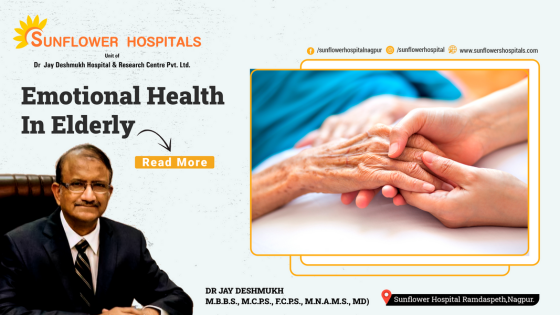Are social isolation and loneliness same and are they linked to physical illnesses?
You might live alone, but can have an active social life. You can feel lonely even if surrounded by people. They are also linked to physical illnesses and other health issues. They include high blood pressure, obesity, heart disease, weak immune system, Alzheimer’s disease and memory loss.
What are the symptoms of emotional issues and mental disorders in adults?
Having trouble having positive emotions, noticeable changes in mood, energy levels or appetite. Difficulty in sleeping or sleeping too much. Increased worry or feeling stressed. Anger, irritability or aggressiveness, headaches, digestive issues and pain. Misuse of drugs and alcohol, sadness or hopelessness, thoughts of death, obsessive thinking or compulsive behaviour, seeing, hearing and feeling things that other people do not hear, see or feel are common in the elderly with
emotional issues
What are the common symptoms of depression in the elderly?
Depression though common in the elderly is not a part of normal ageing. Chronic health conditions, physical limitations and loss of loved ones are major contributing factors. While one feels depressed at times, if these feelings last for weeks or months, it may suggest depression. Feeling sad or hopeless, helpless or guilty, loss of interest in once enjoyable activities, decreased energy, difficulty sleeping, irritability, moving or talking more slowly and thoughts of death or suicide are symptoms of depression in the elderly.
Can something be done to reduce depression in the elderly?
Taking regular care of one’s self and maintaining social contact can be beneficial in maintaining good mental health. Getting regular exercises, maintaining a regular sleep pattern, having a healthy diet and staying active with hobbies is suggested.
What could be the mental health promotion and prevention strategies for older adults?
These strategies focus on healthy ageing. Despite losses in capacity, creating a better social and physical environment is important for the elderly. Protection from ageing and physical and mental abuse is important. Financial support and psychological interventions may be helpful.
What are the coping strategies?
Adapting a new lifestyle, mindfulness and meditation techniques can assist in managing stress, anxiety and negative emotions. Encouraging positive outlooks, self compassion and finding joy in daily life activities contributes to resilience.
What about professional support?
Mental health support from Psychiatrists, counsellors and support groups are important.There should be a safe space for expression. Medications are given under medical supervision, particularly in managing clinical depression and severe anxiety.


